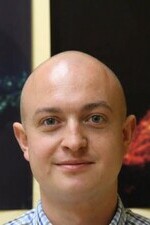

My scientific activity focuses on the study of astrophysical phenomena using polarimetric methods, with particular emphasis on white dwarfs and their optical properties. I participated in work related to the calibration of the RINGO3 polarimeter of the Liverpool Telescope, which represents a significant contribution to the development of precise polarimetric techniques. As part of my collaboration with the research team using the RoboPol polarimeter, I conducted research on the optical linear polarization of white dwarfs, including helium-rich objects, which provided new data on the structures of magnetic fields and atmospheres of these stars.
My research also includes the processing and analysis of astronomical data from optical telescopes. I use advanced polarimetric data analysis techniques to provide detailed descriptions of the physical properties of celestial objects, such as white dwarfs and active galactic nuclei (AGN). As part of the international RoboPol collaboration, I participated in polarimetric monitoring of AGNs, which contributed to a better understanding of the dynamics and variability of jets from these objects.
In addition to polarimetry research, I actively participate in research projects concerning exoplanets. As part of the TESS Grand Unified Hot Jupiter Survey, I contributed to the identification and characterization of 20 new gas giant exoplanets. Furthermore, I participate in the ExoClock project, which aims to precisely determine the transit times of known exoplanets, which is crucial for maintaining the accuracy of the ephemerides used in further astronomical observations.
My research activities contribute to expanding knowledge about the structures and properties of planetary systems, as well as improving methods for detecting and analyzing exoplanets and other distant astronomical objects.
My teaching activities include conducting courses in astronomy, numerical methods, and data analysis, allowing students to acquire both theoretical and practical knowledge in these areas.
I teach the course Scientific Computing and Numerical Methods, which aims to introduce students to computational techniques and numerical tools used in natural and technical sciences. This course enables students to develop problem-solving skills in the field of modeling physical phenomena.
The course Advanced Optical Data Analysis Laboratory focuses on the practical aspects of processing and analyzing optical data from astronomical observations. These classes help students develop skills in data processing and interpretation using modern analytical tools.
In the course Astronomical Instruments, I introduce students to the principles of construction and operation of key devices used in astronomical research, such as telescopes, spectrometers, and polarimeters. The aim of the course is to develop skills in designing and using research instruments.
In the course Basics of Data Analysis, I introduce students to fundamental concepts and methods of data analysis, with an emphasis on applications in astrophysics. Students learn how to process, analyze, and visualize data using appropriate computational tools.
Additionally, I teach the course Stellar Systems, Structure of the Universe, and Cosmology, which covers topics related to stellar evolution, the dynamics of star systems, the structure of the universe, and modern cosmological theories. This course aims to introduce students to advanced topics in astrophysics and cosmology.
As part of my educational activities, I also collaborate with high school students by organizing workshops on operating a meteor observation station and analyzing data obtained from remote telescopes. The goal of these activities is to provide scientifically valuable data that supports research projects while promoting STEM fields (science, technology, engineering, mathematics). These initiatives aim to encourage young people to pursue studies in science and technology and foster their interest in modern research methods.
My teaching activities place great emphasis on developing analytical and practical skills in students and pupils, enabling them to effectively apply the knowledge they have gained in scientific research and their professional careers.


